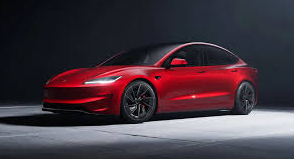
Growing Competition and Musk’s Political Stance Weigh on Tesla’s Market Value
Tesla’s stock price has plunged by over 9% following a sharp drop in its sales across the EU and UK, which fell by nearly 50% in January.
As a result, the company’s valuation has dipped below the $1 trillion mark for the first time since November 2024. Analysts attribute this slump to intensifying competition from Chinese and other manufacturers, as well as CEO Elon Musk’s controversial political statements.
According to trade body Acea, the broader European electric vehicle market expanded by over a third in January. However, Tesla’s sales across the EU, EFTA, and UK declined by more than 45%, with a more than 50% drop within the EU alone.
This follows a difficult year for Tesla, which saw its annual sales decrease for the first time in over a decade due to weakening demand and growing competition.
Investment director Russ Mould of AJ Bell identified rising competition as a primary reason for Tesla’s struggles. Chinese automaker BYD, in particular, has gained ground by offering additional features as standard, which are often optional extras from other brands.
Mould also suggested that some consumers may be avoiding Tesla due to Musk’s divisive political views. In the US, he has played a role in cutting development funds and advocating for drastic federal budget reductions. In the UK, he has voiced support for imprisoned far-right activist Stephen Yaxley-Lennon, known as Tommy Robinson, while criticising Prime Minister Sir Keir Starmer. Additionally, Musk has backed Germany’s far-right AfD party, congratulating its leader on a recent electoral success.
Peter Bardenfleth-Hansen, a former senior executive at Tesla’s Europe, Middle East, and Asia division, told the BBC that Musk’s political affiliations are “definitely one of the reasons” for Tesla’s struggles, but they are part of a broader set of challenges creating a “domino effect.”
“Musk’s actions may be winning him followers in certain circles, but those are not necessarily the customers who buy Teslas or invest in the company,” Bardenfleth-Hansen remarked.
Tesla’s stock initially surged following the US election due to Musk’s close ties with Donald Trump, who he has referred to as his “first buddy.” Investors believed this connection would benefit Tesla. However, Trump has expressed opposition to electric vehicles and pledged to reverse policies aimed at increasing their adoption.
“This was never going to be good for Tesla—how anyone thought otherwise is beyond me,” Mould said.
Concerns about interest rate cuts and Trump’s potential trade tariffs are also contributing to market uncertainty, further pressuring Tesla’s stock, he added.










